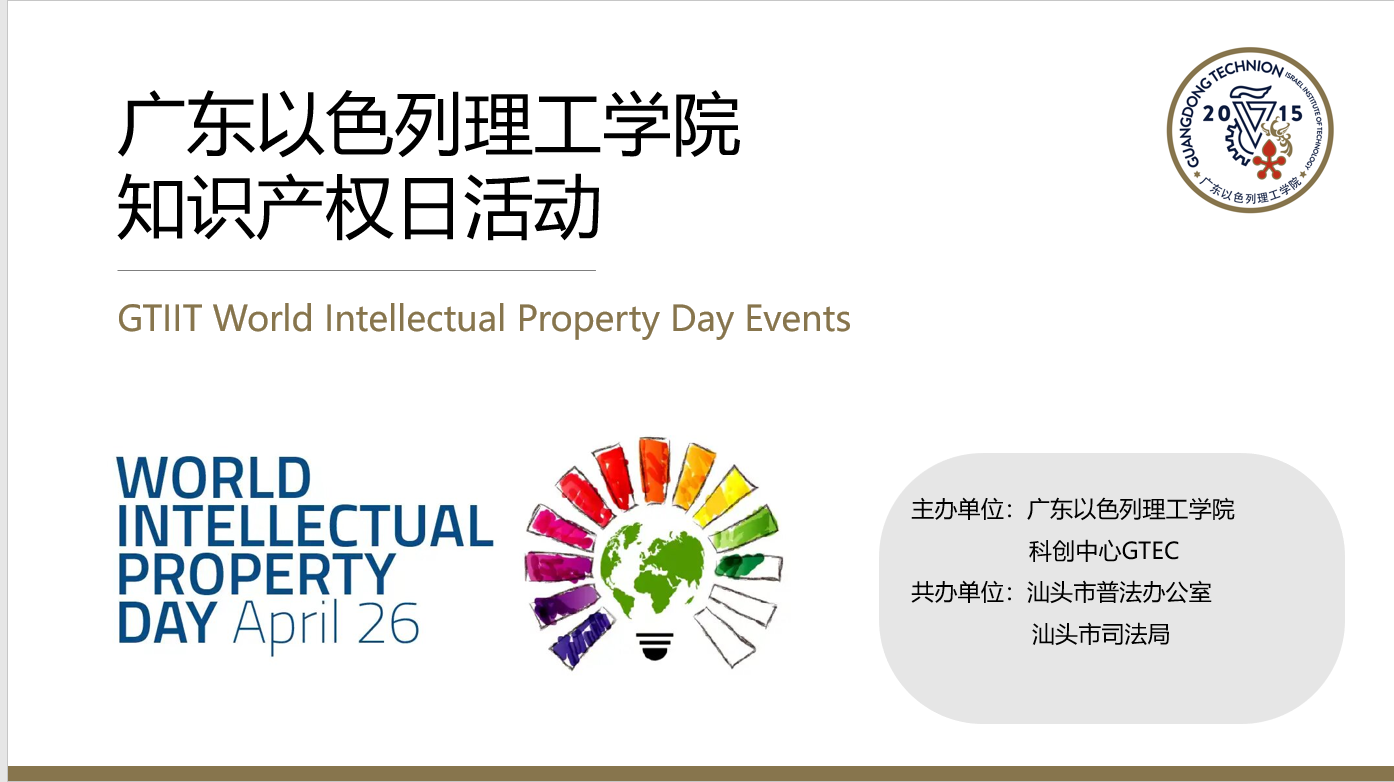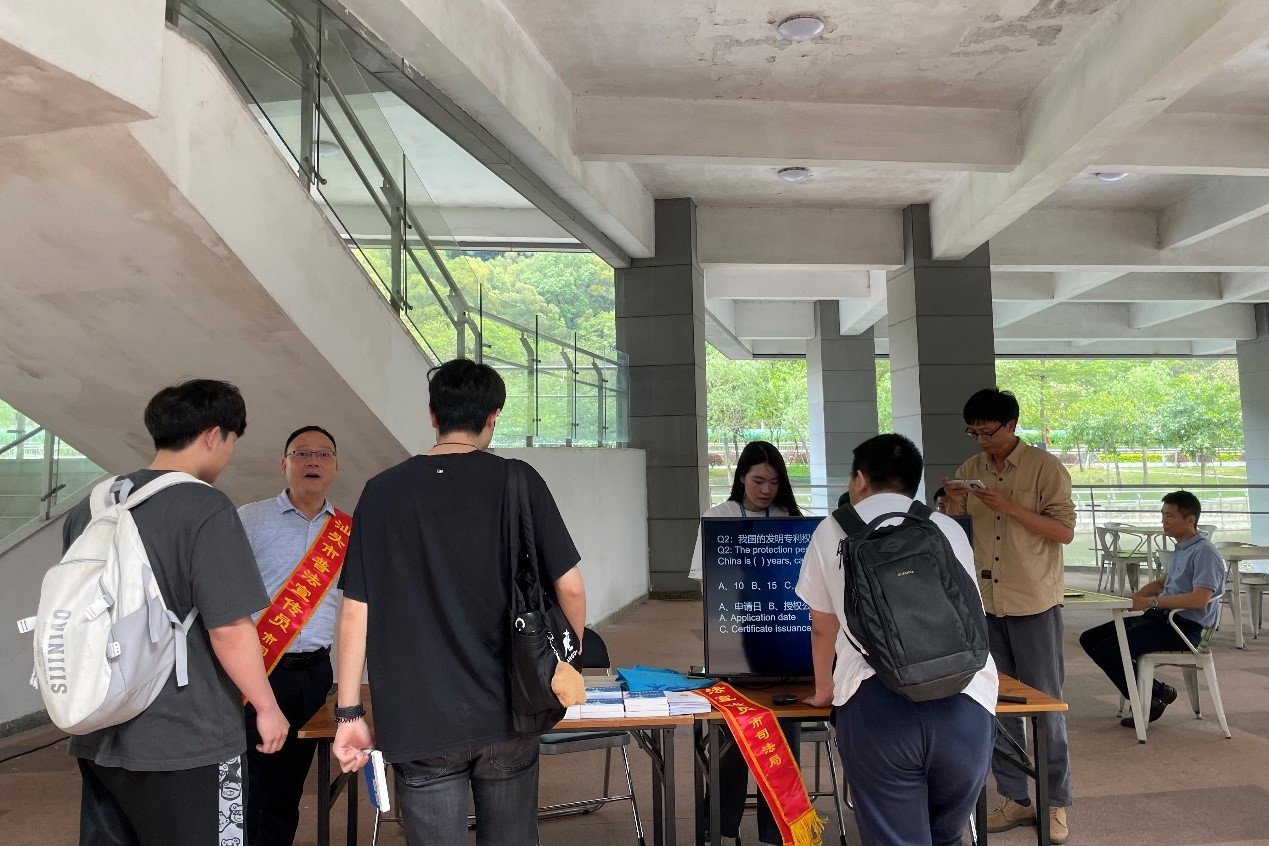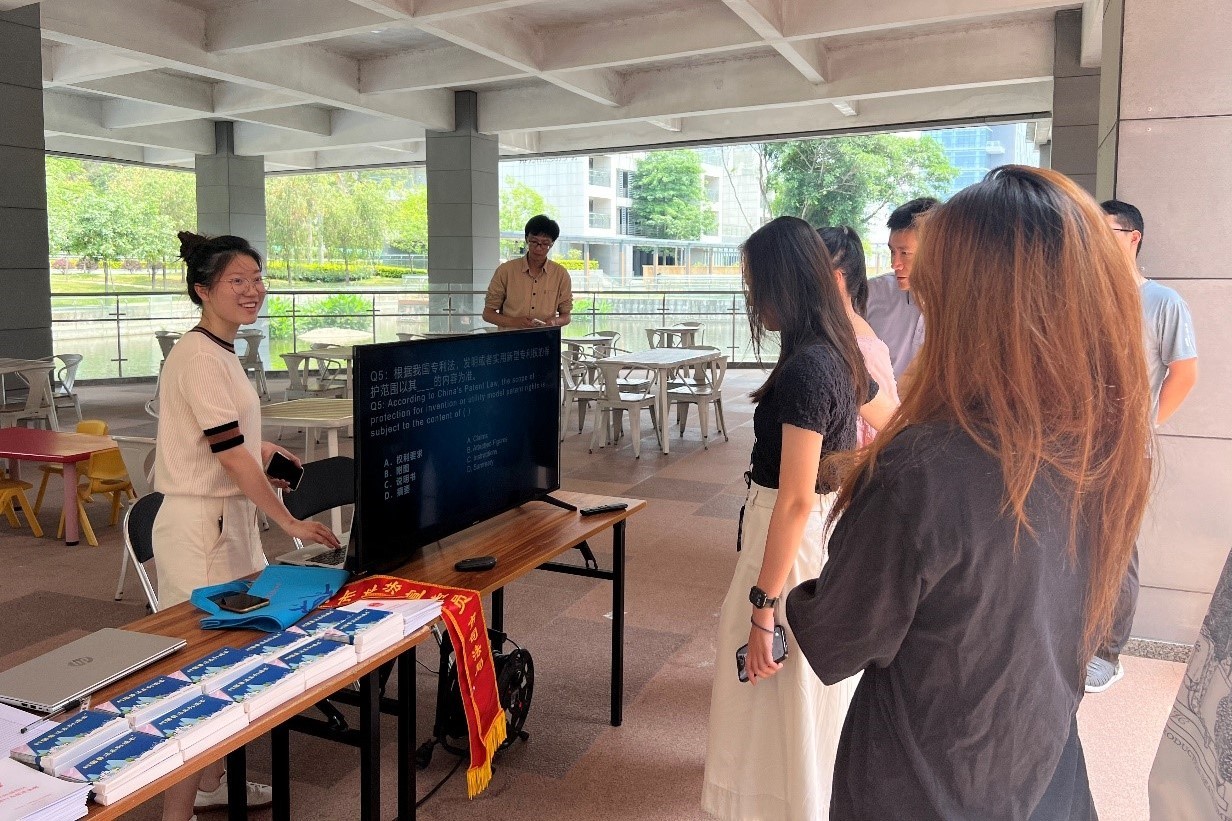PostTime:7/12/2024
To build respect for Intellectual Property (IP) among GT community, GTIIT Technology Entrepreneurship Center (GTEC) recently cooperated with the Shantou Municipal Bureau of Justice, Shantou Municipal Public Legal Education Office, and patent agency to carry out World IP Day activities on campus by forms of lectures, posters, and Q&A sessions etc.

At the booth, engaging Q&A sessions on IP ignited participating enthusiasm among GT members amid a warm atmosphere. The posters, with vivid images and brief explanation on it, provided IP-related information such as tech transfer and fast pre-examination.


"What is a patent? Why should we apply for a patent? How to evaluate the value of a patent? What factors should be considered in overseas patents?" During the lecture, patent agents shared relevant strategies under the global vision through vivid case analysis, explaining IP concept to foster a better understanding of it and facilitate IP value. The audience responded with frequent applause and lively discussion arose.
Prof. Moris S. Eisen, Pro-Vice Chancellor of GTIIT spoke highly of the event. “Universities are the main sources of innovation, protecting IP is of great significance to the protection of innovation fruits. The cutting-edge scientific research in GTIIT has generated valuable IP and will create abundant opportunities to cooperate with the industry, which is expected to apply GT advanced technologies to society. This is an excellent opportunity to encourage GT members to "jump out of the inherent thinking" for innovation, which is conducive to strengthening the connection between GTIIT and the industry.”
Michael Lv, director of GTEC, expressed warm welcome to the guests. As he introduced, GTIIT has attached great importance to innovation and entrepreneurship based on IP. In 2021, GTEC was established here to manage IP protection, commercialization, industry-university-research collaboration, innovation and entrepreneurship of GT faculties and students, actively promoting the establishment of IP and tech transfer systems.
IP Q&A for GTers
Q
How should we protect the content/technology of our paper when we want to publish it?
A
In this case, it is recommended to apply for a patent first and publish the paper later, because the law protection of your work begins when the patent application is submitted.
Q
If I only get a preliminary idea, to what extent can I apply for IP protection?
A
It depends. If the application is a chemical formulation, clear experimental data to prove its feasibility is required. If the application is about the assembly of mechanical equipment, elaboration of its characteristics is needed.
Q
If I invent something A and register it as a patent in China, how should I protect my rights if someone applies A as a patent in other countries?
A
Others cannot apply for your protected patent since each of our submitted patent information will be sent to the Patent Cooperation Treaty (PCT) for filing. If you (the patent official right owner), want to apply for cross-border patent, you can do it through PCT, which is valid in over 150 countries of the Convention. You can also submit an application of a specific country. Patent protection is territorial, and your technology patent will only be considered for granted when it is filed locally.
Q
In horizontal cooperation, does the state have any regulations regarding patentees and inventors?
A
1. Article 859 of the Civil Code, Contract Section: For inventions completed through commissioned development, unless otherwise stipulated by law or agreed upon by the parties, the right to apply for a patent belongs to the research and development personnel. If the research and development personnel obtain patent rights, the commissioning party may implement the patent in accordance with the law.
2. Article 11 of the Implementing Regulations of the Patent Law: An inventor is the person who makes a creative contribution to the substantive characteristics of an invention. Individuals who are solely responsible for organizing work, facilitating the use of material conditions, or engaging in other auxiliary work during the process of completing the invention should not be considered as inventors or designers.
The current IP protection ideology of the state differs from the conventional thinking of "I provide the funding, so I naturally obtain the patent." For enterprises wishing to become intellectual property rights holders, we encourage research and development personnel to actively participate in research cooperation, make creative contributions to the substantive characteristics, and form jointly owned intellectual property.
Q
What are the specific differences between technology development, technology services, technology consulting, and technology licensing contracts?
A
1. Technology development refers to the research and development of new technologies, new products, new processes, new materials, systems, etc., between the parties. Technology development contracts include commissioned development and collaborative development.
2. Technology services refer to one party providing services to solve specific technical issues for another party, such as common services like calculation, design, measurement, debugging, inspection, and testing. The commissioning party pays a technology service fee to the service provider.
3. Technology consulting refers to one party providing consulting services to another party using their own technology and expertise, such as feasibility studies, technical forecasts, specialized technical investigations, analysis and evaluation reports, etc. The commissioning party pays a technology consulting fee to the service provider. Technology consulting contracts do not include construction engineering contracts and contracting contracts.
4. Technology licensing refers to the licensor granting the right to use existing technological achievements to the licensee, with the licensee paying an agreed-upon licensing fee to the licensor.
Q
How do I choose a patent agency company when applying for a patent? Can I choose a patent agent myself?
A
GTEC will provide a list of patent agencies that have cooperated with GTIIT, and information on their company strength, area of expertise, service, price reference, etc. will be offered. Applicants can choose agents based on the characteristics of the patents they plan to apply for, interview them, and select a partner for cooperation. Applicants can also recommend reputable agent suppliers themselves and collaborate with them after evaluation by the university.
Q
Are there any standard contract templates or process guidelines for reference?
A
GTEC's official website provides you with more information and common contract templates. Welcome to visit https://sites.gtiit.edu.cn/gtec/.
Text: GTEC, GTIIT News & Public Affairs
Photos: GTEC
© GUANGDONG TECHNION-ISRAEL INSTITUTE OF TECHNOLOGY | 粤ICP备17036470号
